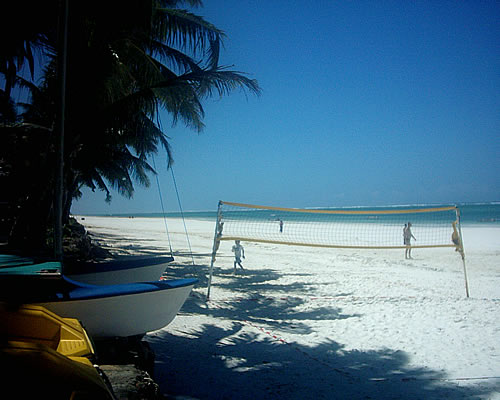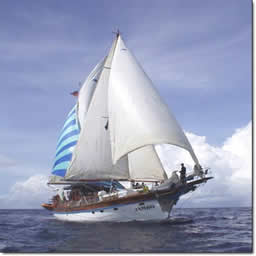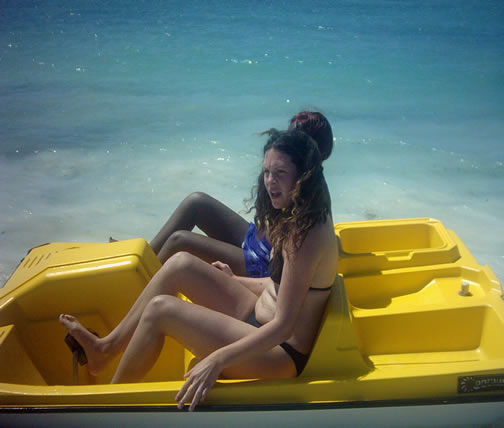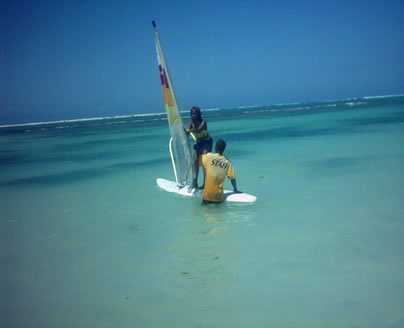|
Adventure
....................................................................................................................................
Watersports

Watersports are in abundance and of a high quality
at the Kenyan coast, ranging from the more extreme wind and
kitesurfing to jet skiis, deep sea dving and fishing, to the milder
snorkelling, pedal boats, kayaking, catamaran, among others.
Not all beach hotels have these facilities so
enquire first when booking your trip.
Snorkeling
If you choose to snorkel in the marine parks run by
Kenya Wildlife Service you may get a boat and guide at a minimal
fee. Park fees are also payable from as low as Kshs.300 per resident
adult and US$ 10 per Non –resident adult. The Watamu National Marine
Park boasts over 600 species of fish in just 10 square kilometers,
although the reserve area itself spreads out over more than 32 sq km
in total. Malindi's park is also rich in its diversity, while the
rest of the coastline has a reef with adequate fish to please all
snorkellers.
Deep sea fishing
Divers outside the fringe reef in Watamu's national
park stand an excellent chance of viewing the magnificent whale
shark and Manta Rays that are seasonal visitors. Some of the more
commonly seen fish include the parrotfish, whose digestion of the
coral reefs over the millennia have produced the white sand beach
itself. Also angelfish, groupers, filefish, lionfish and snappers.
Game fishing is fun and not just for seasoned anglers. With a bit
of practice anyone can catch fish and enjoy this magnificent sport.
Kenya offers some of the finest deep sea fishing in the world with a
huge variety of different species close to shore, especially in the
virgin territory off Kiwayu island past Lamu where 2 hours is ample
time to catch loads of fish. A day-spent fishing is an adventure in
itself.
Hotels offering deep water fishing have twin engined craft that
are in touch with each other and the shore base by radio link. Each
boat carries lifesaving and fire fighting equipment on board and
bigger craft are equipped with a head.
There are three categories of boats: -
1. Over 33 foot diesel powered sport fishing boats designed to
take up to a maximum of four passengers, definitely the most
comfortable way to fish, with plenty of room to sit or lie down and
relax while waiting for action.
2. 20 to 25 foot twin outboard powered craft for up to two
passengers, and being smaller boats, you are right where it's all
happening. (Available only during the Kaskazi months of calmer
weather)
3. Small craft for up to four passengers fishing
inshore/birdwatching or just exploring the beautiful Mida Creek.
Fishing seasons
From beginning July to sometime in May. The southeast wind (Kusi)
blows from mid March to sometime in November and is cooler than the
northeast (Kaskazi) which blows the rest of the time. The seas are
warmer and calmer during the Kaskazi months.
Types of fish
The main Billfish (Sailfish and
Marlin) season runs from November to early April but Sailfish and
Black Marlin often come inshore in numbers in August.
Sailfish (known locally as ‘suli
suli') are by far the most numerous of the Billfish we have here.
Finicky and sometimes skittish or playful, they can make a fool of
the best of anglers at times, and are very dramatic when not over
powered by excessively heavy tackle. Experienced anglers will know
this spectacular acrobat is more fun on light tackle - ask for it!
Pelagic, sails will jump and slither across the surface of the water
in a never to be forgotten display. Relatively easy to bring in when
hooked (that's the tricky part) the Sailfish is a milestone in any
anglers' early fishing experience.
Then there is the Royal Family: the Marlin. We have three types here - Striped,
Blue and Black. Striped Marlin tend to run offshore in cleaner water
and can travel in packs. Smaller and slimmer than the other two,
this fish will still gives a good account of itself.
A jumping Blue Marlin is the ultimate
thrill as the power and fury of these fish under full throttle is
simply awesome. Complete changes of direction by these fish will
convince fishermen that there are two on at once and frantic
re-routing of the boat is the order of the day as line is usually
getting desperately low within seconds of the opening of
hostilities.
A big Blue Marlin is a privilege to see and they are found
usually in the deep water following the yellowfin or other tuna
shoals. Some very big Blue Marlin can be expected mid February to
mid March.
Black Marlin come closer to shore and
are often encountered in very shallow water. The buffalo of the
species, this guy is tough. If you haven't done your homework he'll
find you out and be gone. Often fighting deep, using his pectoral
fins to hold him down in the water they are worthy adversaries
(especially little ones!). Medium size Blacks can be expected around
August/September, but the main season is from December to mid/late
March.
Broadbill Swordfish - This is an
overnight specialty - you drift at night, with squid weighted to
different depths, and light sticks on the leader and we have
developed night trolling techniques which have become very
productive. This is definitely the strongest fighter in the ocean -
an experience not to be missed. So far mainly small, but several in
a night not uncommon.
We support wholeheartedly the practice of ‘Tag and Release' of
Billfish and award certificates to anglers who have done so.
Sharks - Hammerheads, Tigers and the
high leaping Mako. These are often caught while fishing for tuna,
they also take Marlin baits.
Big Yellowfin tuna (up to 200 lbs.)
migrate past here between August and November (and sometimes come
back again) and the ‘schoolie' small Yellowfin are around virtually
year round. Very strong fish and, with a big one being a good test
of character, Yellowfin always give a powerful performance,
invariably going deep.
Giant trevally (locally known as
Karambesi) of World record size are here but have yet to be boated
under the very strict IFGA regulation. Usually caught on live bait
using down riggers.
Wahoo are renowned for their searing
first run (being one of the fastest fish in the sea) and when there
are a lot of them around, chaos reigns as lines are cut all over the
place by fish striking at terminal tackle moving through the water.
Kingfish will often chop up a bait or
two just behind the hook before you get one but make up for it by
being excellent table fare. Dorado (known here as Falusi) come
streaking across to your lures, iridescent with all the colours of
the rainbow as they take to the air when feeling the hook. Fabulous
light tackle fish and great eating (but rich) when prepared on the
day of catch.
Skipjack, Kawakawa and others of tuna
descent swim in shoals surrounding and forcing small baitfish to the
surface, making it boil and giving their position away.
Email now to
find out how and where you can go fishing for al the above....
Let's go Fishing!
Off shore banks over fifty miles N.E. of Watamu are the exciting
new area full of tuna, Marlin and Broadbill at night.
Day trips start at 3am, and overnight trips drifting for
Broadbill are two days and a night trip. You can return with three
species of Marlin, Broadbill and a Shark, as well as a boatload of
tuna. Such trips must be arranged in advance and booked specially.

The popularity of specialty fishing, such as fishing for Sailfish
on a fly grows every year. This is a fun method, but difficult, but
once hooked the fly fisher isn't interested in traditional trolling!
We also have bottom fishing unequalled anywhere, in 500' feet of
water Snappers and big grouper fight for your baits. This can be
combined with trolling.
Full fishing days begin at 0630 hours.
PADI courses on offer include:
• Scuba Review (from USD130)
• Discover Scuba Diving (from USD145)
• Scuba Diver+ (from USD330)
• Open Water Diver+ (from USD490)
• Open Water Referral* (from USD300)
+Materials and certification (from USD100)
*Certification 35
For whale shark expeditions aboard a wooden hull that offers
comfortable accommodation for upto 12 guests around Pemba Island email now to get
rates and images.
For 7 nights pay 1350.00 Euros per person.
Single cabin supplement:350.00 Euros.
Group Price : (pay 8 pax.) 10400.00 Euros
This rate is inclusive off:
· accommodation
· All meals and
selected drinks.( Coffee, tea, +1 glass of wine at dinner)
· All towels and linen
· All diving
· Cylinders, air fills
and weight belts
· Airport transfers to
/ from Pemba and Mombasa International Airport
· Beach excursions and
Island visit.
· Beach and bush walks
The rate is exclusive off:
· International and
domestic flights
· Visas for Tanzania +
Kenya
· Pemba tourist fees
(US$15)
· Marine park /
reserve fees (US$ - 10 per day)
· PADI diving courses
· Diving equipment
hire
Other sports...
 Pedal
boat Pedal
boat
Catamaran
The ocean's waters are a bit rough as it is mid-year, the
so-called ‘monsoon season' here. So if you would rather come to the
coast at a time when the sun is out more and the ocean calmer, plan
your holiday between September and March.
Riding the catamaran requires that you wear a life jacket, even
though the sports is done well within the reef. The water is cool as
we move out. The instructor positions us on either side of the
catamaran for balance, jumps on and we're off, bobbing up and down.
Instructors always accompany guests so as to allay any fears and
basically ensure that you get your money's worth. He constantly
changes the sail's position in accordance with the direction of the
wind. This is actually more relaxing than taking a ride in an
engine-powered motor boat, because the only sounds here are the wind
and the waves. You can hire the catamaran for a full hour, but since
we have more to explore we head back to shore for the next sport.
Kayaking
Next up is kayaking. Stephanie, who is an expert, briefs me on
the mechanics of kayaking first. It's similar to rowing a boat. I am
rather scared at the prospect of being alone in this craft, though
the instructor rows beside me as I totter on the waves, constantly
giving instructions until I am confident enough. It takes some
getting used to but once you get the hang of it, it feels great
cutting through the waves. After the first round I am deemed
experienced enough to go out on my own.
Pedal boat
Next is the pedal boat. Cecilia joins me again on this gadget
that is really simple to handle. All you do is pedal as if you are
riding a bike, and use a gear stick to change direction. And
parents, you can share the fun with your children because there is
space behind the seats where they can be accommodated.
Windsurfing
Okay, so what's next? Well, it's an activity that I have long
wanted to try out. Windsurfing. First I have to wear rubber shoes
that will offer grip on the surfboard. The instructor then begins
the lesson. Place both hands on the board, drag yourself up, and
then try to rotate while still balancing. This is not easy. The sail
is then connected to the surf board and the instructor then
demonstrates how to climb on and bring it up from the water. Now
it's my turn. The sail is much heavier than it looks, and trying to
balance at the same time doesn't help. But if you fall hey just jump
right back on and try again!
Thankfully the guides are patient. My third attempt is a bit
better, but not quite there yet. Fourth time round and I actually
manage to sail off for some distance. And on the fifth and final
attempt- slowly but surely, off I go!
 Surfing...well, trying to
Surfing...well, trying to
Glass bottomed boat
After lunch we decide to engage in a less strenuous activity. We
will be taking a ride on the Polepole glass bottomed boat up to the
reef.
It is early afternoon and the tide is going out as we set off
from shore. The mid-section of the boat's floor is fitted with a
glass through which we can view the fish swimming over the coral
reef in the now shallow water.
So as to attract the fish, one of our guides picks a sea urchin
from the coral for the fish to feast on. This is a delicacy for them
because normally they cannot penetrate the thorny skin to get to the
soft insides.
Glass-bottom boat rides work well for people who do not want to
get their feet or body wet snorkelling. You will still get to see
some fish and coral reef formations. As we head back to shore we
pass some fishermen in a jahazi on their way out to fish.
Jet Skiing
Zooming around on the surface of the water with enough metres
beneath to not touch the seabed wasn't exactly my idea of an ideal
way to experience the ocean. Not until a new British friend dared me
to experience the wonders of the ocean lying in my own backyard,
accompanied by the all too common phrase that "You only live once!".
So I lived. Dean and I shared a jetski, me precariously hanging onto
his lifejacket from behind, he steering across the waves with the
utmost glee, seaspray splashing into our eyes and noses and my mouth
that was open in a scream half the time. Then he took a turn- and I
fell in. Now knowing I have a life jacket on is all well and good.
But treading water alive with waves and having watched all those
shark movies didn't help at all! So with one of the instructors
hovering around us on his own jet ski, Dean got me to calm down and
heaved all 55 kilograms of me back aboard. Suffice it to say we
didn't stay out much longer but hey - I did it didn't I?!
Check back soon
for more exciting and relaxing watersports off our beautiful
coastline....
Accommodation rates and
images
Related links:-
Copyright 2007.
All rights reserved. Exotic Expeditions Limited.
| 


